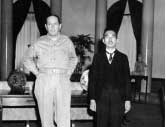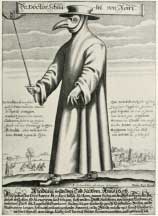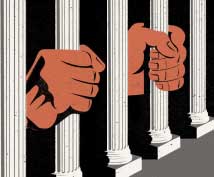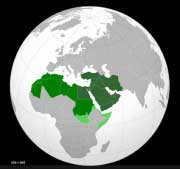Fall 2023

HONR 200-01: Talking Democracy [2931]
Instructors: David Hoffman and Ricky Blissette, Center for Democracy and Civic Life, and Simon Stacey, Honors College
Wed. 4:30-7:00pm
Honors College Seminar Room [LIB 216M]
The central questions that the course will explore include: What is the role of a citizen in a democracy? What is the “self” that participates in self-government and civic life? How does language shape our perceptions? How do different modes and styles of communication embed or undermine democratic values? How can people make intentional use of language and communication to foster democratic relationships and civic health? Considering these questions will involve drawing on insights from the fields of psychology, political science, American studies, history, English, and media and communication studies. In addition, this course will help students build skills that enable them to initiate and enact positive social change and will enable students to emerge with greater confidence and clarity about how to move forward as contributors to collective problem-solving and community-building.

HONR 200-02: You Are What You Eat [3233]
Instructors: Allison Tracy, Biological Sciences
Tues./Thurs. 11:30-12:45am
Honors College Seminar Room [LIB 216M]
In this course, students will be introduced to the most recent advances in nutritional studies and will have the opportunity to research current nutritional topics. The class will utilize work in physiology, biochemistry, and molecular biology (made accessible to non-STEM majors), psychology and anthropology to explore the influence of attitudes, beliefs, preferences, and cultural traditions on food choices. We will explore questions such as, Why are some diets more appropriate for people with a certain genetic composition? How does nutrition affect our behavior and mood? Finally, we will investigate the crises caused by malnutrition and poverty, assessing how the world community addresses these issues.

HONR 300-01: Occupying Enemy Japan, 1945-52 [1820]
Instructors: Constantine Vaporis
Tues./Thurs. 10:00-11:15am
Honors College Seminar Room [LIB 216M]
Since 2001, military occupations have been the subject of public discussion around the globe. In contrast to the U.S. occupations of Afghanistan and Iraq—generally considered major failures—the Allied (largely American) occupation of Japan following World War II has been commonly viewed as successful. In this course we will explore the American experiment to demilitarize and democratize Japan and its legacy today, which is still heavily debated. Together we will examine this encounter between the cultures from both the American and Japanese perspectives, asking questions such as, Did America fundamentally remake Japan or simply act as a catalyst for change already visible before the war? What was the Japanese people’s contribution to the events taking place in their country during these years? We will utilize the most recent scholarship on the Occupation as well as visit the Gordon Prange archive at College Park.

HONR 300-02: The Experimental Theater [2512]
Instructors: Nikki Hartman, Theater
Mon./Wed. 2:30-3:45pm
Honors College Seminar Room [LIB 216M]
A great wave of innovative work in the American theatre began around 1960, spurred on by the pressing need felt around the world to create a theatre that reached deeply into the soul of human experience. The result was a vibrant and personal new theatrical language, one that continues to influence the nature and form of theatre performance, film, and television today. Through selected readings and viewing of archival digital performances, this course will look closely at some of the artists who pioneered the American Experimental Theatre Movement and essentially devised new forms of theatrical experience. The course will culminate with a student performance that utilizes the ideas and techniques of the artists studied during the course.

HONR 300-03: History of Science [2708]
Instructors: Randy Kidd
Thurs. 4:30-7:00pm
Honors College Seminar Room [LIB 216M]
This interdisciplinary seminar traces the history of science from the ancient world to the early 21st Century. We will consider, among other topics, the development of atomic theory, the mechanical world picture, the 17th century Scientific Revolution, the rise of scientific societies, germ theory, and the development of the theory of evolution by natural selection. We will also consider pseudo-sciences such as phrenology and Social Darwinism, as well as the philosophy of “scientism.” We will focus on work by Aristotle, Zhang Heng, Ibn al-Haytham, Galileo, the Lavoisiers, Darwin, Lise Meitner, Richard Feynman and many others. In our primary-source readings, we will consider both the scientific content and historical and philosophical context of key scientific discoveries.

HONR 300-04: Criminal Justice [2926]
Instructors: Jeffrey Davis, Political Science
Tues./Thurs. 1:00-2:15pm
Public Policy Building [PUP 354]
The United States imprisons more people per capita than any other country in the world and it jails African Americans at a much higher rate than white Americans. This course examines the U.S. criminal justice system, exploring how crimes are defined, prosecuted, and punished. In the course we explore the following questions: How do racial and economic inequality affect outcomes in the U.S. criminal justice system? To what extent does the process of criminal justice comply with the constitutional and human rights protections of the accused? Students will examine court cases where they will confront conflicting arguments on legal and political issues; they will also encounter materials that reflect the work of underrepresented scholars, lawyers, advocates, justices, and government officials. Finally, the class will visit a Baltimore City Circuit Court to observe a criminal trial.

HONR 300-05: Understanding HIV and AIDS [2927]
Instructors: Jodi Kelber-Kaye, Honors College
Thurs. 1:00-3:30pm
Honors College Seminar Room [LIB 216M]
This course will focus on how HIV and AIDS are understood in the United States, both in terms of their domestic presence and global manifestations. We will examine biological, policy, artistic, and activist ways of producing knowledge about the virus, how those knowledges, or understandings, depend on each other for meaning. We will also be looking at how these knowledges are interdisciplinary and, while they depend on each other for their meanings, those meanings are often contradictory or even ultimately untrue. Readings will come from all of these disciplines, but no particular expertise in any of them is required for this course. Besides reading, there will be shorter and longer writing assignments, and a group project that includes an intervention in cultural expressions of HIV and AIDS.

HONR 300-06: Cultures in the Middle East and North Africa [2928]
Instructors: Samir El Omari, MLLI
Mon. 4:30-7:00pm
Honors College Seminar Room [LIB 216M]
This seminar will introduce students to topics of the historical and modern Middle East and North Africa (MENA), examining these societies and cultures through regionally and historically focused investigations. Students will review MENA’s perceptions across the Arab World, focusing on the Arabian Peninsula (Saudi Arabia and the UAE), the Middle East/Levant (Lebanon, Iraq, and Syria), Egypt, and Morocco. Students will analyze case studies involving topics such as women’s rights in the MENA region, child refugees in the Levant area, MENA geopolitics and global energy, and the multi religious context of the region. Students will also gain skills in intercultural communication and cross-cultural competence.
06/14/2023